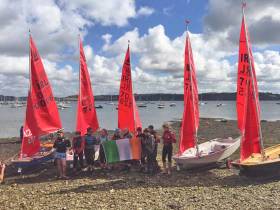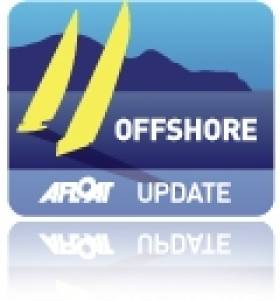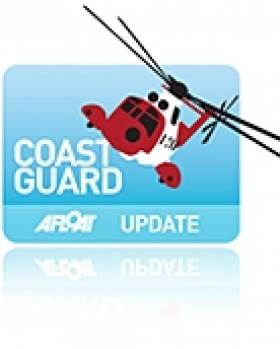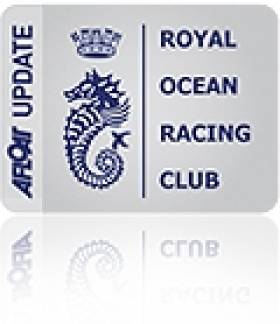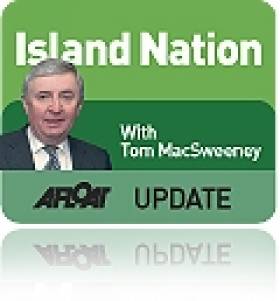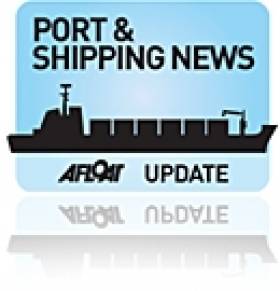Displaying items by tag: falmouth
Cornish Harbour Gets ‘Living Wall’ to Promote Biodiversity
A Cornish harbour has teamed up with a local environmental charity to install a set of special tiles to make a ‘living wall’ for marine wildlife and plant life.
According to Marine Industry News, the ‘Habitiles’ now in place in Falmouth Harbour are designed with nooks and crannies for marine life to proliferate where it normally wouldn’t in a flat-walled harbour.
“We’ll see seaweeds and algae making their home here which then provide shelter and food for small invertebrates which in turn become a food source for larger animals,” said Tina Robinson from charity Our Only World.
The tiles are manufactured locally from byproducts of the granite and quarrying industries, and manufacturer ARC Marine says their production will soon be carbon-neutral.
Similar installations in Plymouth and Australia use tiles made by Sydney-based Living Seawalls, which recently signed a production and supply partnership for the UK and Ireland with Co Offaly’s Inland and Coastal Marina Systems (ICMS).
Marine Industry News has more on the story HERE.
Lucky Number 13 For Best Irish Pair At 2017 Mirror Worlds
#Mirror - Caolan Croasdell and Alexander Farrell of Lough Ree Yacht Club were the best of the Irish at the Mirror Worlds in Falmouth this week, placing 13th overall in the 51-boat fleet.
Highlights for the Irish contingent over the five days of sailing from Monday 31 July to Friday 4 August included a best finish of fifth in Race 2 by Ben Graf and Hannah Smith of the same club, who placed 15th overall.
Graf and Smith also scored a top-ten finish in Race 7 alongside Croasdell and Farrell.
Of the other Irish pairs in competition, Sarah White and Eoghan Duffy of Sligo Yacht Club finished 20th, Oscar Langan and Lughaidh Croasdell (Clontarf Y&BC/Lough Ree YC) weren’t far behind at 24th, while Matthew White and Isaac Marsden (Sligo YC) were 37th in the fleet.
Next year’s Mirror Worlds will take place in Sydney, Australia from 31 December 2018, giving Ireland’s hopefuls an extra few months to train for even better results.
Missing Solo Sailor Airlifted To Cork Hospital
#Offshore - BBC News reports that a sailor who went missing last week during a solo voyage from Plymouth to Portugal has been located and airlifted to hospital after falling overboard.
The 66-year-old man set off last Monday 10 June but apparently suffered chest injuries during the first night.
Falmouth Coastguard has difficulty contacting the man to determine his position but he was eventually found some 225km off the Isles of Scilly. He was later transported by helicopter to Cork for treatment.
Wet, Shocked but Unharmed, Two Crew Plucked from Liferaft off Ardglass
At 4.40pm Belfast Coastguard were notified through MRCC Clyde that Falmouth Coastguard had received an EPIRB from the fishing vessel 'Islander' that was believed to be fishing in their area. Just afterwards Belfast Coastguard received reports of a flare and wreckage just of Ardglass, Northern Ireland.
Fishing vessel 'Golden Shore' went to investigate and found the Islander's two crew in a life raft. They were wet, shocked but unharmed.
Ian Murdock Belfast Coastguard Watch Manager said:
"Despite the dramatic and rapid loss of their vessel this crew were prepared for this eventuality. They were able to raise the alarm quickly and are tonight safe and well.
"This swift resolution of what could have been a life ending incident is the reason that we recommend that all vessels are fitted with an EPIRB which can automatically send a distress alert and, give an accurate position of your vessel to the Coastguard with through a satellite based rescue system
Carrickfergus Navigator Ian Moore Plots Aegir Caribbean Course
On loan from the Oracle America's Cup Team, Northern Ireland ace navigator Ian Moore is the navigator on board the Carbon built 80-footer Aegir for this week's RORC race in the Caribbbean.
Antigua Yacht Club is buzzing with excitement, with two days to go to the start of the 600-mile race around the central Caribbean. Yacht crews are busy at work making final preparations for the Royal Ocean Racing Club's (RORC) Caribbean 600. Falmouth Harbour is an impressive sight with the RORC fleet safely moored up next to the yacht club.
RORC Yacht of the Year ready for battle
Piet Vroon's Ker 46, Tonnerre de Breskens - the RORC 2010 Yacht of the Year - arrived just before dusk on Friday. The delivery crew, all six of whom will also be racing, endured a 1,000 mile beat to Antigua from Jamaica: "This will be our fourth and final event in the Caribbean." Explained Piet Vroon. "This is the first time that I have done this race and it is the main reason that we came to the Caribbean. All of my crew said that this is a race that they want to do and I am very much looking forward to it."
Tonnerre is one of three boats that competed in the Pineapple Cup, the opening rubber of the Atlantic Ocean Racing Series. George David's Rambler 100, Richard Oland's Vela Veloce and Hugo Steinback's Dubois 90, Genuine Risk also competed in the Pineapple Cup which Genuine Risk won on corrected time. Vela Veloce is a Southern Wind 52, which cleaned up in Key West race week in January.
Entries from Australia and 14 other nations
Yachts representing 15 Nations have come to Antigua to compete in the 600-mile spectacular, but none have come as far as Chris Bull's Cookson 50, Jazz. The canting-keel flyer arrived in Antigua on Friday, having made an epic journey bycontainer ship and sail from Australia, after a fantastic performance in the Rolex Sydney Hobart.
"It's been hard work getting the boat here from Australia, but we have done it, which just goes to show it is possible." Commented Boat Captain, Anthony Haines. Jazz's journey started on January 8th from Sydney, Australia to Savannah, Georgia. After which the delivery crew sailed 1400 miles to get Jazz to Antigua on time.
"Ever since the RORC conceived the idea of this race I have wanted to do it," said Chris Bull on he dock in Antigua. "I am also keen to do the Transatlantic Race and try and win the Atlantic Ocean Racing Series which I think is an excellent initiative which the RORC are involved with."
Rock Stars and Corinthian Sailors Rub Shoulders
From Lithuania, the Volvo 60, Ambersail debuts in the Caribbean and counts veteran round the world sailor Magnus Olsen in their crew. Ambersail is well travelled, having competed in last year's Sevenstar Round Britain and Ireland Race and the Rolex Middle Sea Race.
Ondeck's Farr 65, Spirit of Minerva counts British solo-sailor Hannah White amongst the crew: "Effectively there are 10 legs and well over 600 miles of racing in fantastic trade wind conditions which I am sure will be a strong test for navigators and crews in equal measure." Commented Hannah.
Class 40 World Champions on the line
Six Class 40s are expected, possibly more. Tony Lawson's Concise and Gonzalo Botin are past and current Class 40, world champions. Tony Lawson, owner of Concise expects a close duel with Tales: "There is no doubt that the Spanish team will be fast and possibly more suited to lighter conditions, but I am confident that the team on Concise will be fully focused and they are in control of a quick, well prepared boat."
Power and Elegance Combine
RORC Commodore, Andrew McIrvine has chartered the elegant and powerful 154 ft schooner, Windrose of Amsterdam. The crew has taken the magnificent yacht through its paces, spending two days practicing manoeuvres: "It is a very different kind of sailing to my First 40." Commented Andrew McIrvine. "The sheer size of the sails and equipment make for extremely physical work and manoeuvres are far more complex. Communication from front to back is only possible by hand signals. We had some good pressure during our practice session, which confirmed that Windrose is a powerful yacht, literally built for Caribbean sailing."
Navigator's make their Predictions
Brian Benjamin's Carbon Ocean 82, Aegir has been out testing sails and the crew, visiting the top part of the race course all night Friday. Night sailing makes up close to half the time during the race. Boat captain Shreda Duke confirmed that the exercise was very successful in bedding in the crew to their proposed watch-system. Aegir's navigator for the race is Ian Moore on loan from the Oracle America's Cup Team. Moore concurs with Hugh Agnew, ICAP Leopard's navigator, the prediction of stable trade wind sailing but added: "The first key area of the race may well come as night falls. Aegir should be approaching Nevis at dusk and the first really tricky part of the course. The islands of Nevis and St Kitts are high, which will throw out quite a wind shadow through this area; there will be a lot of gear changes in between the lulls and puffs of acceleration. The big decision from a navigator's point of view will be how far off the leeward side of these islands to go."
In Falmouth Harbour, the air temperature is a balmy 27º C and a fair breeze is flowing in from the northeast, meaning that the trade winds are functioning, but it's an ever-changing picture. Read John Burnie's expert summary on the RORC Caribbean 600 web site: http://caribbean600.rorc.org/
100 footers Go Head to Head
ICAP Leopard set the monohull course record in 2009, completing the course in 44 hr 5 min 14 sec and Mike Slade's team believe that they could beat the record, although they may not be the first home. George David's stunning Maxi, Rambler 100 is dockside in Falmouth and are favourites to take line honours. George David has secured the assistance of Ken Read to the afterguard and some of Ken's Puma Volvo Ocean Race crew. It is the first time that these two 100 foot canting keel maxi's have raced each other with ICAP Leopard having taken an interesting strategy and dropped their rating considerably, in a bid to gain handicap honours.
Local Knowledge from Caribbean Entries
Local interest comes from Bernie Evan-Wong who is competing in the race for the third time in his Mumm 36, High Tension. From Guadeloupe there is a Class 40, Territoires Attitudes, skippered by David Ducosson.
34 boats are expected on the start line on February 21st February. The RORC Caribbean 600 web site contains regular updates on the race, blogs from the boats and the progress of the boats, which have trackers, can be followed via the website: http://caribbean600.rorc.org/
Could Waterford Lead a Tall Ships Revival?
I am aware that a number of groups are examining the possibility of launching a national sail training programme. I wonder if Waterford could be the place to lead it and be the base for national sail training. The marine sector suffers from the neglect and disregard of a disinterested Government so any revival will have to be outside of State support.
Waterford staged a hugely successful visit of the Tall Ships Race in 2005 and has been honoured with the hosting of the Race start next year. Bertie Ahern as Taoiseach snubbed the Race visit in 2005. It showed how little respect he had for the maritime sector. Half-a-million people visited the city, but Bertie couldn't be bothered to do so.
The city has been encouraging young people to get experience of crewing aboard Tall Ships. Twenty-year-old David Murray, a business information systems student at University College Cork, is becoming a sail training "veteran" through experience gained over the past two years.
He first 'shipped out' last year aboard the Tenacious operated by the Jubilee Sailing Trust of the UK, a registered charity which also operates the Lord Nelson. His first voyage, following which he sailed the north coast of Scotland on the Lord Nelson and this year became a Bosun's Mate, taking more responsibility aboard the Nelson on a voyage from Southampton to Glasgow. Then he joined the Dutch three-masted schooner, Eendracht, from Kristiansand in Norway to Hartlepool in the UK, where he disembarked and re-joined the Tenacious, again as Bosun's Mate, sailing to Bruges in Belgium and onto London. A few days later he was back aboard the Lord Nelson as Bosun's Mate from Falmouth to Milford Haven in Wales and then to Waterford, from where the Tall Ships Race will start next year,
"It's been a brilliant experience. I've met a great mix of people. Sail training is for everyone," he said. "It's been a very busy but great couple of summers with Tall Ships and I'm really looking forward to next year, especially with Waterford again hosting the fleet and crews from around the world coming to the city. I strongly recommend sail training and the fact that the races start from Waterford next summer makes it even easier for Irish young people to get involved."
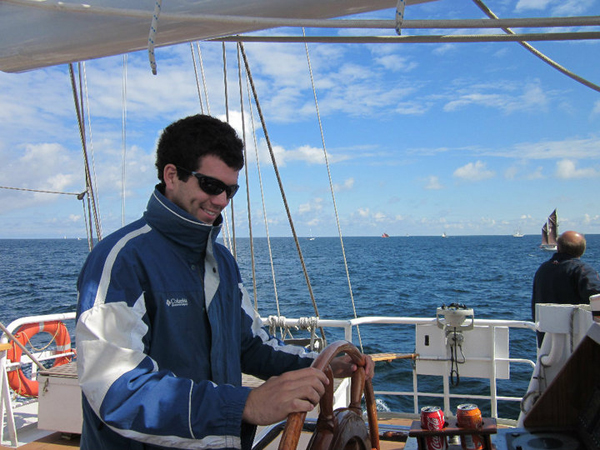
David Murray is a Tall Ships veteran at the age of 20
David comes from Butlerstown in Waterford. His pleasure in the experience of tall ship sailing underlines what has been lost by the shameful behaviour of the Government in closing down the sail training programme.
It will be a national disgrace if there is not an Irish tall ship flying the Tricolour at next year's Tall Ships Race start in Waterford. The city has done magnificent work in putting Ireland to the forefront in the world of tall ships. Perhaps Waterford should be the base for the creation of a new national sail training system.
• This article is reprinted by permission of the EVENING ECHO of Cork where Tom MacSweeney writes maritime columns twice weekly. Evening Echo website: www.eecho.ie
Tanker Assists Dismasted Yacht
Marc Thomas, Watch Manager, Falmouth Coastguard said: Due to the yacht becoming dismasted their communication capability was limited to their handheld VHF radio. They managed to make communication with the tanker as it was passing who then passed on the call to the Coastguard.
This incident is a good example of one seafarer assisting another when the yacht's options were limited due to its dismasting. We were pleased we were able to assist the French sailors.
Falmouth Week Renews Sponsorship
Plans for Henri Lloyd Falmouth Week 2010, 7 – 15 August, are already well in progress, with a winning combination of varied yacht racing and a lively shore-side programme.
Organisers of this prestigious event, the second largest sailing regatta in the UK, are very keen to announce that headline sponsorship has been renewed with Henri Lloyd, the technical sailing and lifestyle clothing company. Sponsorship includes prizes of Henri Lloyd branded clothing and gift vouchers for the sailing competitors, for use in the Falmouth branch in the town centre.
‘Henri Lloyd is extremely proud that we are sponsoring the regatta for the sixth consecutive year and we are looking forward to an exciting regatta with more visiting boats than ever expected’ commented Emma Groves, Manager of the Falmouth Henri Lloyd Sailing Store.
‘It is extremely positive that Henri Lloyd have committed to continuing their sponsorship for a further two years, as the brand name is a great addition to Falmouth Week’ states Richard Gates, Falmouth Town Manager and Chair of the Shore-side committee. ‘There is a wonderful atmosphere in the town with many people visiting and sampling all that Falmouth has to offer. Henri Lloyd sponsoring the event is a natural link between the shore and the water activities. I am very much looking forward to Henri Lloyd Falmouth Week and I encourage everyone to become involved.’
This year sees the incorporation of the hugely popular and competitive ‘South West Area IRC Championships’ sponsored by J & H Bunn, with up to five divisions racing windward/leeward and offshore courses in the one of the finest sailing amphitheatres in the world. Yachts will be brought to Falmouth from as far away as Ireland to take part in this prestigious event.
The 2nd edition of the classic yacht regatta the Pendennis Cup returns to Henri Lloyd Falmouth Week 2010. 30 metre schooners such as ‘Mariette’ and the modern day 26 metre truly classic ‘Velacarina’ will grace our shores, a majestic sight set against the rugged Cornish coast. An exhibition on the Cup and the host company Pendennis Shipyard will also be running for the week at the National Maritime Museum Cornwall.
As well as these newer events, the backbone to Henri Lloyd Falmouth Week still remains the Falmouth Classics Yacht event, Henri Lloyd Dinghy Week and racing for over 26 different classes of yachts, hosted by the seven Sailing Clubs and the Regatta committee around Falmouth Bay.
The Port of Falmouth Sailing Association’s chairman, Steve Nicholls invites all racing sailors and those with a love of sailing to Henri Lloyd Falmouth Week 2010. ‘The revitalisation of the week has been so immensely successful, that it is now time for competitors and their families to venture from all ports on the south coast of England, Wales and Ireland to Falmouth and experience all the fun we are having.’
The Falmouth Town Shore-side Committee is already working to deliver a good mix of fun and varied events for all. The week begins in fine style with the Marching Carnival and leads into a full programme involving Events Square, the Princess Pavilion, Maritime Museum, Pendennis Castle, and businesses and groups throughout the town.
2010 also sees the return of the highly entertaining Falmouth Fun Night at Custom House Quay, sponsored by Golder Associates, with a return challenge between the Falmouth Marine band and the Falmouth Working Boat Association in the re-enactment of the Battle of The Little Big Horne, Custer’s last stand – not to be missed. This follows on from the Red Arrows Air Display Team performing their breath-taking aerial display over Falmouth Harbour, kindly sponsored by the Falmouth Harbour Commissioners.
After last year’s exciting Nippers and Youth event, Surf Life Saving GB will be holding their National Championships for over 1000 Surf Life Savers aged 7to 70 plus at Gyllyngvase Beach for the whole week and will be joining in the Henri Lloyd Falmouth Week festivities. This will be the biggest event ever to be staged of its kind in Falmouth, with its dynamic disciplines of Life Saving Sport.
The week reaches a climax with the magnificent fireworks display over the harbour, sponsored by A & P Falmouth Ltd., Pendennis Shipyard ltd. and Falmouth Petroleum Ltd. As ever, things will not be limited to Falmouth, with special activities also planned in St Mawes, Mylor, Flushing and the Helford.



























